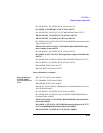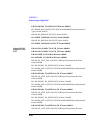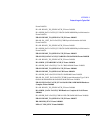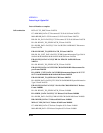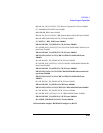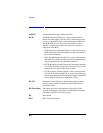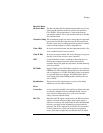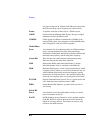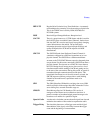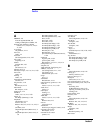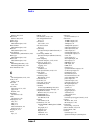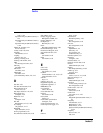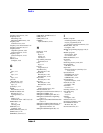
B-3
Glossary
Burst-by-Burst
Bit Error Rate
The Burst-by-Burst Bit Error Measurement makes use of a new
loopback path within the mobile to calculate the equivalent
Class II BER. This measurement is 5 times faster than the
conventional method. This is also sometimes known as Fast Bit
Error Measurement.
Channel Coding The baseband digital process used to arrange the error protected
speech data into the final form necessary for RF transmission.
Channel coding involves adding the following data for channel
control: training sequences, tail bits, and guard bits.
Class I Bits In an error correction scheme, the most important data bits. This
class is subdivided into classes Ia and Ib.
Class II Bits In an error correction scheme, the slowly changing or long-term
data bits. Class II bits receive no error correction.
CRC Cyclic Redundancy Check. A method for detecting errors by
dividing the reception polynomial (which expresses the
reception data) by the generator polynomial, and then detecting
errors by residuals.
DCS1800 Digital Cellular System. DCS1800 is technically very similar to
GSM900 with wider frequency bands leading to more channels
and at a frequency of 1.8 GHz. DCS1800 systems are designed
to cope with higher user densities. DCS1800 mobiles have a
lower output power than GSM900 mobiles, therefore the cell
size is smaller.
Equalization The process used by digital radios to correct for the fading
which occurs in real world conditions.
Error
Correction
A way to provide reasonable voice quality for digital radios that
are subject to Doppler shifts and multipath fading. Types of
error correction include parity bits, cyclic error correction
coding, and convolutional coding.
FACCH When the SACCH reports coming back to the BS indicate that
another cell would offer the mobile a better signal quality, a
handover is necessary. The SACCH doesn’t have the bandwidth
necessary to transfer all the information associated with the
handover. The TCH is replaced by a FACCH (Fast Associated
Control Channel), for a short time using short consecutive
bursts, which have a higher data rate than the SACCH, which



